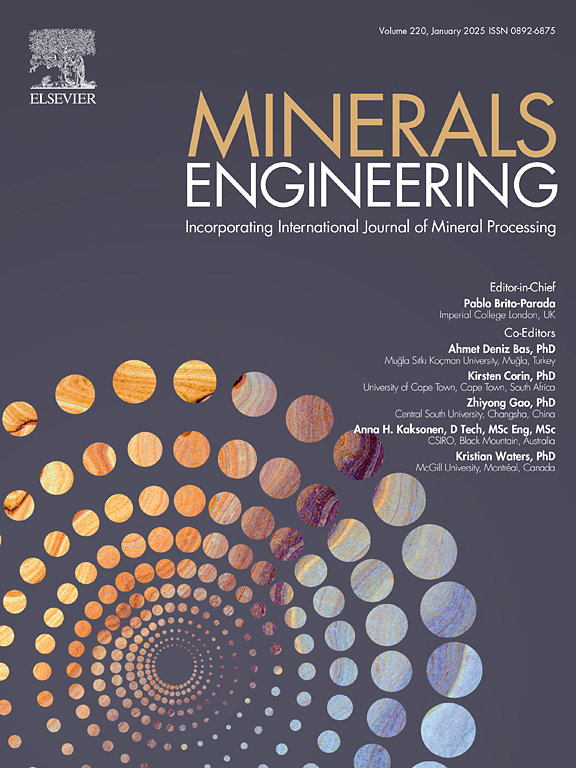Assessment of different energy-based breakage distribution functions in population balance model of an industrial scale continuously operated wet stirred media mill
IF 4.9
2区 工程技术
Q1 ENGINEERING, CHEMICAL
引用次数: 0
Abstract
This study aimed at assessing various energy-based breakage distribution functions Bij within the context of a population balance model (PBM) of copper ore milling in a wet stirred media mill (WSMM). First, drop weight impact tests were performed to determine the size distribution parameters, tn. Second, various tn models called tn-fitted and tn-regenerated approaches were used to fit experimental tn, and their goodness-of-fits were compared. They were then used to construct the matrices of the cumulative breakage distributions, Bij, of the PBM, while a power-law form of the specific breakage rate function, Si, was assumed. By fitting the PBM to the product particle size distributions (PSDs) obtained under various rotor speeds, suspension volumetric flow rate, and solids content, we estimated the Si parameters. Results suggest that except the Napier-Munn model, all tn models fitted the experimental drop weight data reasonably well, which was reflected in the PBM fitting of the product PSDs. The PBM fits with Bij constructed with the tn-regenerated approach were more accurate than those with the tn-fitted approach. The PBM was validated with additional tests that were not considered in the parameter estimation. Overall, we have established that the choice of tn function and the methodology to determine Bij can affect the PBM predictions of the WSMM process significantly.
在工业规模连续运行的湿式搅拌介质磨机种群平衡模型中评估基于能量的不同破碎分布函数
本研究的目的是在湿式搅拌介质磨机(WSMM)中铜矿石研磨的种群平衡模型(PBM)中评估各种基于能量的破碎分布函数 Bij。首先,通过落重冲击试验确定粒度分布参数 tn。其次,使用称为 tn 拟合法和 tn 再生法的各种 tn 模型来拟合实验 tn,并比较了它们的拟合优度。然后,使用它们构建 PBM 的累积破损分布矩阵 Bij,同时假定特定破损率函数 Si 为幂律形式。通过将 PBM 与不同转子速度、悬浮液体积流量和固体含量下获得的产品粒度分布 (PSD) 进行拟合,我们估算出了 Si 参数。结果表明,除 Napier-Munn 模型外,所有 tn 模型都很好地拟合了实验中的液滴重量数据,这也反映在 PBM 对产品 PSD 的拟合中。与 tn 拟合方法相比,用 tn-再生方法构建的 PBM 与 Bij 的拟合更为精确。参数估计中未考虑的其他测试对 PBM 进行了验证。总之,我们已经确定,选择 tn 函数和确定 Bij 的方法会显著影响 WSMM 过程的 PBM 预测。
本文章由计算机程序翻译,如有差异,请以英文原文为准。
求助全文
约1分钟内获得全文
求助全文
来源期刊

Minerals Engineering
工程技术-工程:化工
CiteScore
8.70
自引率
18.80%
发文量
519
审稿时长
81 days
期刊介绍:
The purpose of the journal is to provide for the rapid publication of topical papers featuring the latest developments in the allied fields of mineral processing and extractive metallurgy. Its wide ranging coverage of research and practical (operating) topics includes physical separation methods, such as comminution, flotation concentration and dewatering, chemical methods such as bio-, hydro-, and electro-metallurgy, analytical techniques, process control, simulation and instrumentation, and mineralogical aspects of processing. Environmental issues, particularly those pertaining to sustainable development, will also be strongly covered.
 求助内容:
求助内容: 应助结果提醒方式:
应助结果提醒方式:


